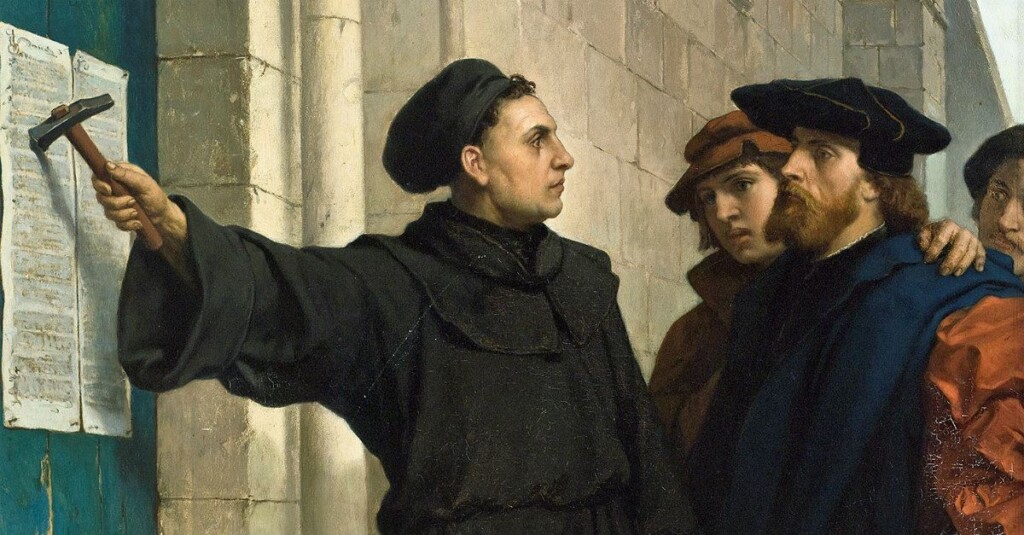Martin Luther was a German theologian and religious reformer who was the driving force behind the Protestant Reformation during the 16th century. His teachings and beliefs had a far-reaching impact on European and world history, influencing topics such as education, politics, culture, economics, and religion. In particular, Luther’s three main beliefs – faith in Jesus brings salvation, the Bible is the ultimate source of truth about God, and Lutheranism holds that the church is made up of all its believers rather than just its clergy – continue to shape religious thought today.
In terms of faith in Jesus bringing salvation, Luther believed that by accepting Jesus as one’s personal savior, individuals could be saved from their sins. He argued that it is through this relationship with Jesus – not good works or any other means – that one can find salvation in God’s grace. While some may see this as leaving little room for human effort in achieving salvation, Luther maintained that good works were an essential result of true faith and should be performed out of love for God.
Luther also asserted that scripture – not a church or its priests – is the final source for truth about God. This was revolutionary at the time since much of Catholic teaching relied on tradition which was often at odds with scripture. Furthermore, he asserted that everyone has access to scripture and can interpret it on their own without relying on Church authority figures like priests or bishops.
Finally, Luther’s Lutheranism suggested that the Church was made up of all its believers; not just those chosen by Church authorities to be clergy or leaders within a local congregation. This idea opened up new opportunities for lay people to take an active role in their spiritual development outside of simply attending Mass or participating in other rituals overseen by clergy members. It also emphasized individual responsibility within a spiritual context as opposed to relying solely on a priest or bishop for guidance.
Martin Luther’s three main beliefs still have tremendous influence today throughout much of Europe and around the world. From his views on faith bringing salvation to his ideas about scripture being accessible to all people regardless of rank or station within the Church hierarchy; these beliefs helped shape religious thought during his era and continue to do so today.
What did Martin Luther oppose and why?
Martin Luther was born in 1483 in Germany. He studied to become a priest and eventually became a professor of theology at the University of Wittenberg. He questioned some of the Catholic Church’s teachings, most notably the doctrine of purgatory, which held that people cold improve their chances of getting into heaven by making monetary donations to the church. In 1517, Luther publicly criticized the sale of indulgences, which were documents that granted remission from punishment for sins. Luther objected to the idea that people could buy their way into heaven and argued that salvation is a free gift from God. In 1521, he was excommunicated from the Catholic Church, but he continued to preach his teachings. Luther’s ideas inspired the Protestant Reformation, a movement that sought to reform the Catholic Church.
What was Martin Luther against?
Martin Luther was against the Catholic Church’s teachings on salvation. He believed that Christians are saved through faith, not through their own efforts. This turned him against many of the major teachings of the Catholic Church.

Why Martin Luther left the Catholic Church?
Martin Luther was born in 1483 in the German city of Eisleben. He grew up in a devout Catholic family, and as a young man, he entered the monastic life, devoting himelf to prayer and religious study. In 1517, Luther became outraged at the Catholic Church’s sale of indulgences — pardons for sins — which he felt exploited people’s fears and vulnerabilities. He also questioned the church’s authority, and disagreed with its teachings on salvation and grace. In 1521, Luther was excommunicated from the Catholic Church, and he went on to found the Protestant Reformation, which challenged many of the church’s traditional doctrines and practices.
What did the pope do to Luther?
Pope Leo X excommunicated Martin Luther in January 1521. This meant that Luther was no longer a part of the Catholic Church and that he was barred from receiving the sacraments. The pope also ordered that Luther’s writings be banned.
How did the church respond to Martin Luther’s beliefs?
The Church responded to Martin Luther’s beliefs by labeling him a heretic, forbidding the reading or publication of his 95 Theses, and threatening him with excommunication. Luther refused to recant his beliefs.
Did Luther believe in purgatory?
Luther did not believe in purgatory. He came to this belief after studying the Bible and coming to the conclusion that there was no evidence of purgatory in Scripture. He also believed that the practice of praying for the dead was not supported by the Bible.
